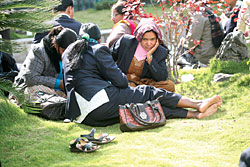 KIRAN PANDAY |
The most inclusive house ever elected in Nepali history was blocked for five months, there is a logjam of legislation waiting for ratification, the budget delay deadlocked development, and important national issues were not debated. The governing coalition actually benefited from the parliament blockade because it could get controversial decisions passed without proper oversight.
Meanwhile, despite the drama of the NC and Maoist leaders meeting around a hospital bed in Singapore, there is no end in sight to the political deadlock. At this stage, it is difficult to say what NC Chairman Girija Prasad Koirala seeks to achieve by forming a 'high-level political mechanism' when grassroots politics bristles with antipathy and apathy towards the governing coalition.
Why do you need another cabal of secretive political bosses making decisions behind closed doors when you already have an elected assembly? The only mechanism we need is parliament. Use that.
If and when it's formed, perhaps the main job of the high-level mechanism will be to work out a power-sharing formula. After all, that is the real reason behind the stalemate (as Krishna Khanal argues) and a consensus government would allow the peace process and constitution writing to restart.
The importance of this can't be dismissed, but the polity faces bigger challenges. The passage of the long-withheld budget through the legislature is welcome, but the government badly needs to make its presence felt throughout the country. It needs to prove that it can function normally without looking too often towards Koirala's residence for nods and winks. No matter what it is called, any mechanism outside the provisions of the interim constitution would lack the mandate to cultivate the culture of consensus in national politics.
Few would argue with the necessity of a government of national consensus. But that is a political necessity that needs to be discussed in the constituent assembly by the elected representatives of the people, not at the hospital beds or drawing rooms of political bosses. Koirala must impress upon Pushpa Kamal Dahal that taking the constituent assembly hostage to political bickering between leaders is sending all the wrong signals to the electorate and the international community. Parliamentarians need to be made to work overtime, not allowed to wallow in forced recesses the country can ill afford.
READ ALSO:
Substance, not form - FROM ISSUE #478 (27 NOV 2009 - 03 DEC 2009)


